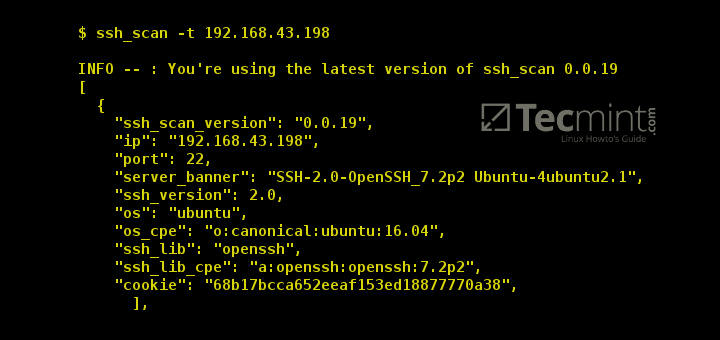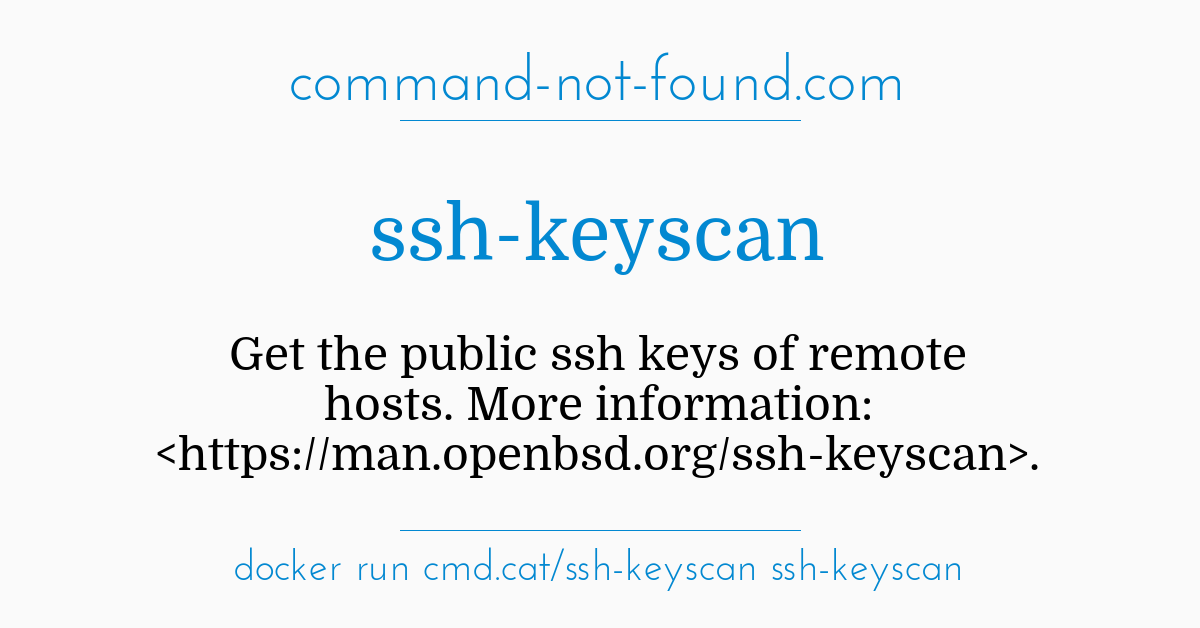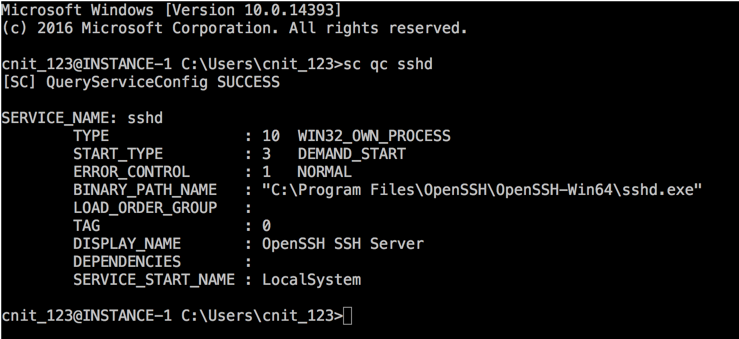As cstamas suggested, you can use ssh -v localhost. Uou simply ssh to yourself 127.0.0.1 on verbose mode, which will display debugging messages of the progress. Yes, through this process you can look at the top of the communication and you can get the SSH version that you are currently running. I wanted to update the pre-installed version of OpenSSH for Windows on Windows 1903, since that one, 7.2p1 had some issues which had reportedly been fixed on v 8.0.0.0. I followed the guide and links as given on - Update OpenSSH for Windows, and subsequently did a Powershell update. However, when typing ssh -V in Powershell, I get, OpenSSHforWindows7.7p1, and not 8.0.0.0 as I was expecting. OpenSSL clients are vulnerable in all versions of OpenSSL before the versions 0.9.8za, 1.0.0m and 1.0.1h. Servers are only known to be vulnerable in OpenSSL 1.0.1 and 1.0.2-beta1. Users of OpenSSL servers earlier than 1.0.1 are advised to upgrade as a precaution. Two varieties of SSH currently exist: version 1, and newer version 2. The OpenSSH suite under Red Hat Enterprise Linux 7 uses SSH version 2, which has an enhanced key exchange algorithm not vulnerable to the known exploit in version 1. In Red Hat Enterprise Linux 7, the OpenSSH suite does not support version 1. Normal OpenSSH development produces a very small, secure, and easy to maintain version for the OpenBSD project. The OpenSSH Portability Team takes that pure version and adds portability code so that OpenSSH can run on many other operating systems (Unfortunately, in particular since OpenSSH does authentication, it runs into a.lot. of differences between Unix operating systems).
The goal of this document is to help operational teams with the configuration of OpenSSH server and client.All Mozilla sites and deployment should follow the recommendations below.The Security Assurance and Security Operations teams maintain this document as a reference guide.
Most default OpenSSH settings that are security-related already provide good security, thus changing them is at your own risk and is not documented here. For example, these guidelines assume only SSH protocol 2 is configured in the server, and SSH protocol 1 is disabled. This also assumes that you are keeping OpenSSH up-to-date with security patches.See man sshd_config, man ssh_config for more information on specific settings if you nevertheless need to change them. |
Configuration
Different versions of OpenSSH support different options which are not always compatible. This guide shows settings for the most commonly deployed OpenSSH versions at Mozilla - however, using the latest version of OpenSSH is recommended.
Modern (OpenSSH 6.7+)
File: /etc/ssh/sshd_config
File: /etc/ssh/moduli

All Diffie-Hellman moduli in use should be at least 3072-bit-long (they are used for diffie-hellman-group-exchange-sha256) as per our Key management Guidelines recommendations. See also man moduli.
To deactivate short moduli in two commands: awk '$5 >= 3071' /etc/ssh/moduli > /etc/ssh/moduli.tmp && mv /etc/ssh/moduli.tmp /etc/ssh/moduli
Intermediate (OpenSSH 5.3)
This is mainly for use by RHEL6, CentOS6, etc. which run older versions of OpenSSH.
Openssh Version 6.5
File: /etc/ssh/sshd_config
File: /etc/ssh/moduli
All Diffie-Hellman moduli in use should be at least 2048-bit-long. From the structure of moduli files, this means the fifth field of all lines in this file should be greater than or equal to 2047.
To deactivate weak moduli in two commands: awk '$5 >= 2047' /etc/ssh/moduli > /etc/ssh/moduli.tmp; mv /etc/ssh/moduli.tmp /etc/ssh/moduli
Multi-Factor Authentication (OpenSSH 6.3+)
Recent versions of OpenSSH support MFA (Multi-Factor Authentication). Using MFA is recommended where possible.
It requires additional setup, such as using the OATH Toolkit or DuoSecurity.
ATTENTION In order to allow using one time passwords (OTPs) and any other text input, Keyboard-interactive is enabled in OpenSSH. This MAY allow for password authentication to work. It is therefore very important to check your PAM configuration so that PAM disallow password authentication for OpenSSH.
OpenSSH 6.3+ (default)
File: /etc/ssh/sshd_config
OpenSSH 5.3+ w/ RedHat/CentOS patch (old)
File: /etc/ssh/sshd_config
PAM configuration for use with the OATH Toolkit or DuoSecurity as second authentication factor.
File: /etc/pam.d/sshd
The PAM stack in this scenario executes the following logic (in our example wefollow the flow with pam_duo.so in use)
- The
pam_sepermit.somodule is called which checks if the user attempting tolog in via SSH is present in the/etc/security/sepermit.conf.If the user is present in the config file, and the config asserts that the usercan only log in if SELinux is enforcing, and SELinux is not enforcing, thenthe PAM control ofrequiredprevents the user from logging in (though PAMwould continue down the stack). - The
password-authinclude is commented out and skipped - The
/lib64/security/pam_duo.somodule is called and the user is prompted fora duo MFA code.- If the code provided is correct PAM immediately permits the user access anddoesn’t continue executing.
- If the code provided is incorrect, PAM continues down the stack
- The
pam_nologin.sochecks if the file/etc/nologinexists and if so blocksaccess to the user. - If at the end of the stack, the single
sufficientcontrol ofpam_duo.sodid not return a success, PAM defaults to deny and denies the login.
Ciphers and algorithms choice
- When CHACHA20 (OpenSSH 6.5+) is not available, AES-GCM (OpenSSH 6.1+) and any other algorithm using EtM (Encrypt then MAC) disclose the packet length - giving some information to the attacker. Only recent OpenSSH servers and client support CHACHA20.
- NIST curves (
ecdh-sha2-nistp512,ecdh-sha2-nistp384,ecdh-sha2-nistp256) are listed for compatibility, but the use ofcurve25519is generally preferred. - SSH protocol 2 supports DH and ECDH key-exchange as well as forward secrecy. Regarding group sizes, please refer to Key management Guidelines.

The various algorithms supported by a particular OpenSSH version can be listed with the following commands:
Configuration
If you have a file containing known_hosts using RSA or ECDSA host key algorithm and the server now supports ed25519 for example, you will get a warning that the host key has changed and will be unable to connect. This means you will have to verify the new host key.
The following configurations expect a recent OpenSSH client, as updating OpenSSH on the client side is generally not an issue.
Modern
This configuration is less compatible and you may not be able to connect to some servers which use insecure, deprecated algorithms. Nevertheless, modern servers will work just fine.
File: ~/.ssh/config
Intermediate (connects to older servers)
This configuration can connect to older OpenSSH servers which run old or intermediate configurations.
File: ~/.ssh/config
Key generation
Large key sizes are used as SSH keys are not renewed very often (see also Key management Guidelines).
Don’t hesitate to create multiple different keys for different usages. In particular, never mix your personal and Mozilla keys.
You may then want to add the new key to your SSH agent or your configuration file (or both).
Protection of user keys
- Protected by strong passphrase.
- Never copied to another system than your own workstation/personal physical disks/tokens.
- Use SSH forwarding or SSH tunneling if you need to jump between hosts. DO NOT maintain unnecessary agent forwarding when unused.
Protection of machine keys

When SSH keys are necessary for automation between systems, it is reasonable to use passphrase-less keys.
- The recommended settings are identical to the user keys.
- The keys must be accessible only by the admin user (root) and/or the system user requiring access.
- Usage of machine keys should be registered in an inventory (a wiki page, ldap, an inventory database), to allow for rapid auditing of key usage across an infrastructure.
- The machine keys should be unique per usage. Each new usage (different service, different script called, etc.) should use a new, different key.
- Only used when strictly necessary.
- Restrict privileges of the account (i.e. no root or “sudoer” machine account).
- Using a ForceCommand returning only the needed results, or only allowing the machine to perform SSH-related tasks such as tunneling is preferred.
- Disable sftp if not needed as it exposes more surface and different logging mechanisms than SSH (and thus scp) itself.

Multi-factor bypass setup for machine keys
Machine keys do not play well with multi-factor authentication as there is no human interaction.
- All logins from machine accounts should be protected by an additional authentication layer (VPN, another machine, etc.).
- All logins from machine accounts are only allowed within the private IP-space, and if possible, only the relevant machine source IPs should be accessible.
File: /etc/ssh/sshd_config (OpenSSH 6.3+)
File: /etc/ssh/sshd_config (OpenSSH 5.3+ w/ RedHat/CentOS patch)
Auditing your existing SSH keys
Existing keys are generally stored in ~/.ssh/ (Linux/OSX) or %APPDATA% (Windows). Look for id_{rsa,ed25519,ecdsa,dsa}, identity, IdentityFile, *.pem, and other identity files.
Display SSH keys information
SSH agent forwarding
ATTENTION SSH Agent forwarding exposes your authentication to the server you’re connecting to. By default, an attacker with control of the server (i.e. root access) can communicate with your agent and use your key to authenticate to other servers without any notification (i.e. impersonate you).For this reason, one must be careful when using SSH agent forwarding. Defaulting to always forwarding the agent is strongly discouraged.Note also that while the attacker can use your key as long as the agent is running and forwarded, he cannot steal/download the key for offline/later use.
SSH forwarding allows you to jump between hosts while keeping your private key on your local computer. This is accomplished by telling SSH to forward the authentication requests back to the ssh-agent of your local computer. SSH forwarding works between as many hosts as needed, each host forwarding new authentication request to the previous host, until the ssh-agent that holds the private key is reached.
On each host, two environment variables are declared for the user enabling ssh-agent:
- $SSH_AUTH_SOCK declares the location of the unix socket that can be used to forward an authentication request back to the previous host.(ex:
/tmp/ssh-NjPxtt8779/agent.8779). Only present if using SSH agent forwarding. - $SSH_CONNECTION shows the source IP and port of the previous host, as well as the local IP and port. (ex:
10.22.248.74 44727 10.8.75.110 22).
To use ssh-agent, add the flag -A to your ssh commands:
You can set the following configuration parameter in your local ssh configuration at ~/.ssh/config.
Hardening the Agent forwarder
It is possible to require confirmation every time the agent is used (i.e. when you connect to a server through the SSH agent) by using the -c flag:
It is also possible to lock the key in the agent after a configurable amount of time, this can be done either for all keys when starting the agent, or per key when adding the keys to the agent with the -t flag:
For MacOSX in particular it’s possible to save the passphrase in the Keychain. If you do so it is strongly recommended to also change the keychain setting to lock itself when the computer is locked, and/or to timeout and lock the keychain. These settings are not controlled by OpenSSH.
Recommended, safer alternatives to SSH agent forwarding
OpenSSH >=7.3
OpenSSH 7.3 onwards allow users to jump through several hosts in a rather automated fashion. It has full support for scp and sftp commands as well as regular ssh.
For example to reach a host behind a bastion/jumphost:
You can also add these lines to your ~/.ssh/config
Older versions of OpenSSH
It is possible to directly forward ports for single jumps instead of forwarding the agent. This has the advantage of never exposing your agent to the servers you’re connecting to.

For example, you can add these lines to your ~/.ssh/config
This will automatically forward the SSH connection over ssh.mozilla.com when you connect to a mozilla.com SSH server.
Key material handling
Key material identifies the cryptographic secrets that compose a key. All key material must be treated as MOZILLA CONFIDENTIAL GROUP RESTRICTED data, meaning that:
- Only individual with specific training and need-to-know should have access to key material.
- Key material must be encrypted on transmission.
- Key material can be stored in clear text, but only with proper access control (limited access).
This includes:
- OpenSSH server keys (
/etc/ssh/ssh_host_*key) - Client keys (
~/.ssh/id_{rsa,dsa,ecdsa,ed25519}and~/.ssh/identityor other client key files).
Client key size and login latency
In order to figure out the impact on performance of using larger keys - such as RSA 4096 bytes keys - on the client side, we have run a few tests:
On an idle, i7 4500 intel CPU using OpenSSH_6.7p1, OpenSSL 1.0.1l and ed25519 server keys the following command is ran 10 times:
time ssh localhost -i .ssh/id_thekey exit
Results:
| Client key | Minimum | Maximum | Average |
|---|---|---|---|
| RSA 4096 | 120ms | 145ms | 127ms |
| RSA 2048 | 120ms | 129ms | 127ms |
| ed25519 | 117ms | 138ms | 120ms |
Keep in mind that these numbers may differ on a slower machine, and that this contains the complete login sequence and therefore is subject to variations. However, it seems safe to say that the latency differences are not significant and do not impact performance sufficiently to cause any concern regardless of the type of key used.
Reference documents
About Ansible¶
Ansible is an IT automation tool. It can configure systems, deploy software, and orchestrate more advanced IT tasks such as continuous deployments or zero downtime rolling updates.
Ansible’s main goals are simplicity and ease-of-use. It also has a strong focus on security and reliability, featuring a minimum of moving parts, usage of OpenSSH for transport (with other transports and pull modes as alternatives), and a language that is designed around auditability by humans–even those not familiar with the program.
We believe simplicity is relevant to all sizes of environments, so we design for busy users of all types: developers, sysadmins, release engineers, IT managers, and everyone in between. Ansible is appropriate for managing all environments, from small setups with a handful of instances to enterprise environments with many thousands of instances.
You can learn more at AnsibleFest, the annual event for all Ansible contributors, users, and customers hosted by Red Hat. AnsibleFest is the place to connect with others, learn new skills, and find a new friend to automate with.
Ansible manages machines in an agent-less manner. There is never a question of how to upgrade remote daemons or the problem of not being able to manage systems because daemons are uninstalled. Because OpenSSH is one of the most peer-reviewed open source components, security exposure is greatly reduced. Ansible is decentralized–it relies on your existing OS credentials to control access to remote machines. If needed, Ansible can easily connect with Kerberos, LDAP, and other centralized authentication management systems.
This documentation covers the version of Ansible noted in the upper left corner of this page. We maintain multiple versions of Ansible and of the documentation, so please be sure you are using the version of the documentation that covers the version of Ansible you’re using. For recent features, we note the version of Ansible where the feature was added.
Ansible releases a new major release approximately twice a year. The core application evolves somewhat conservatively, valuing simplicity in language design and setup. Contributors develop and change modules and plugins, hosted in collections since version 2.10, much more quickly.
Installation, Upgrade & Configuration
- Installation Guide
Using Ansible
- User Guide
Contributing to Ansible
- Ansible Community Guide
Extending Ansible
- Developer Guide
Common Ansible Scenarios
Network Automation
Openssh Version Check
- Network Getting Started
- Network Advanced Topics
- Network Developer Guide
Ansible Galaxy
- Galaxy User Guide
- Galaxy Developer Guide
Openssh Version Release Dates
Reference & Appendices
